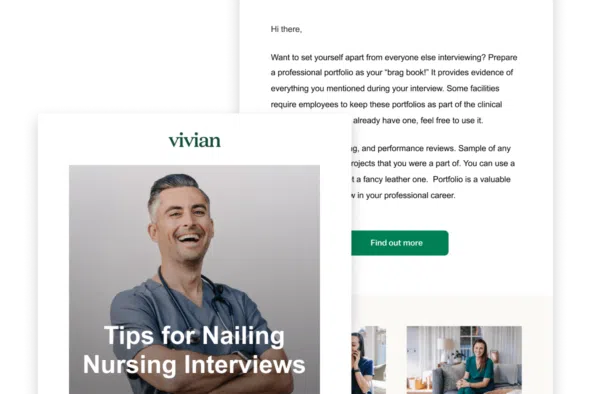Inside all of us is a moral compass that guides us in our everyday lives, that thing inside that tells us right from wrong and steers us in the direction of good or bad. It propels you to make decisions throughout the day. As a nurse, every decision you make goes through your moral compass, but a deep understanding and the need to uphold the nursing code of ethics also guides your decision-making.
It’s safe to say that nurses face ethical dilemmas daily. These dilemmas are complex, and it’s imperative to have a strong framework for ethical decision-making to guide these challenges effectively. You must be familiar with the Code of Ethics for Nurses if you have a registered nurse, licensed practical/vocational nurse or nurse practitioner role. This way, when confronted with a challenging decision, you know where to turn for guidance in your decision-making process.
Let’s explore the nursing code of ethics in-depth. First, we’ll define the code to ensure you understand its purpose. Then, we’ll discuss the nine provisions and common ethical dilemmas and offer tangible suggestions on using nursing ethics to guide your practice.
Understanding the Nursing Code of Ethics
According to the American Nurses Association (ANA) website, the Code of Ethics for Nurses “is the social contract that nurses have with the U.S. public.” The ANA first established the code in 1926 to act as a compass and guiding principle for nurses as they navigate the problematic life-and-death decisions they face daily for patients. The nursing code of ethics helps nurses support each other professionally and have confidence in their own decision-making. It also helps nurses provide and advocate for the best and safest care for their patients.
The 9 Provisions and Common Ethical Dilemmas in Nursing
The ANA’s Code of Ethics for Nurses with interpretive statements comprises nine provisions. These provisions serve as the ethical standards guiding nurses. Let’s examine the provisions, then explore one common ethical dilemma associated with each that may arise in your nursing practice and how to handle it.
Provision 1
“The nurse practices with compassion and respect for the inherent dignity, worth and unique attributes of every person.”
Mr. Johnson has been admitted to the hospital following a severe car accident and is in critical condition due to significant blood loss. Despite the medical team’s recommendation for a blood transfusion to save his life, Mr. Johnson, a devout Jehovah’s Witness, adamantly refuses on religious grounds.
While the nurse understands the importance of respecting his wishes and preserving his dignity, the nurse also recognizes the potential consequences of adhering to his refusal of treatment, which could result in his death.
The nurse engages in open and empathetic communication with Mr. Johnson and his family to address the dilemma. The nurse seeks to understand the reasons behind his refusal of blood transfusions and explores alternative treatment options that align with his religious beliefs while still prioritizing his health and well-being.
The nurse collaborates with the healthcare team, including the attending physician and hospital ethics committee. The nurse navigates the delicate balance between respecting Mr. Johnson’s autonomy and upholding their duty to provide compassionate care. Through the nurses’ advocacy and respect for his beliefs, the nurse ensures Mr. Johnson receives the highest quality of care while honoring his right, dignity and autonomy to refuse a blood transfusion.
Provision 2
“The nurse’s primary commitment is to the patient, whether an individual, family, group, community or population.”
A nurse working in end-of-life care faces a dilemma with Mr. Smith, a terminal lung cancer patient. His daughter wants increased pain medication for him, but Mr. Smith values lucidity over sedation.
The nurse respects Mr. Smith’s autonomy but also wants to relieve his suffering. The nurse discusses options with Mr. Smith and his daughter, balancing pain relief with his desire for alertness. Collaborating with the team, they develop a tailored plan to manage symptoms while preserving Mr. Smith’s autonomy and quality of life.
Provision 3
“The nurse promotes, advocates for and protects the rights, health and safety of the patient.”
A nurse working in a pediatric mental health unit cares for a teenage patient showing signs of substance abuse. The patient confides in the nurse about drug experimentation and overindulgence but requests confidentiality, even from their parents. Understanding confidentiality’s importance, the nurse also sees the risks of withholding vital information for the patient’s well-being.
After reflection, the nurse prioritizes the patient’s safety, encouraging them to seek help for substance abuse and to include their parents in their care. This route upholds ethical principles while promoting the patient’s best interests, ensuring they receive necessary support while respecting their rights and dignity.
Provision 4
“The nurse has authority, accountability and responsibility for nursing practice; makes decisions; and takes action consistent with the obligation to provide optimal patient care.”
Heather, a nurse working on a busy, short-staffed unit, finds herself in a challenging situation when she realizes she has made a medication error. Despite her best efforts to follow protocols, she administered the wrong medication to a patient.
Heather immediately reports the error to her supervisor and fills out an incident report. She acknowledges her mistake and provides all necessary information for documentation and follow-up.
Heather’s decision to report herself demonstrates her commitment to patient safety and optimal care. By taking accountability for her actions, she upholds the standards of nursing practice and takes the necessary measures to prevent similar errors in the future.
Provision 5
“The nurse owes the same duties to self as to others, including the responsibility to promote health and safety, preserve wholeness of character and integrity, maintain competence and continue personal and professional growth.”
Phil, a new nurse, feels burnt out from his demanding job. Despite his dedication to patient care, Phil neglects his own well-being. He realizes his duty to himself includes promoting health and preserving integrity. Phil decides to seek support, set boundaries and prioritize self-care. By balancing his needs, he maintains competence and promotes a culture of well-being in the workplace.
Provision 6
“The nurse, through individual and collective effort, establishes, maintains and improves the ethical environment of the work setting and conditions of employment that are conducive to safe, quality health care.”
A nurse observes poor communication and gossip among healthcare team members, leading to errors in patient care. Recognizing their duty to establish a safe, quality environment, the nurse initiates discussions and collaborates with leadership to implement communication strategies and model positive communication among colleagues. The nurse’s efforts improve teamwork and foster a culture conducive to ethical, high-quality care.
Provision 7
“The nurse, in all roles and settings, advances the profession through research and scholarly inquiry, professional standards development and the generation of both nursing and health policy.”
A nurse in charge of recruitment for a research study confronts the challenge of securing informed consent while meeting recruitment quotas. Despite pressure to enroll quickly, the nurse prioritizes comprehensive consent, ensuring participants understand the risks and benefits. Balancing research goals with patient autonomy, the nurse upholds ethical practice while safeguarding informed consent.
Provision 8
“The nurse collaborates with other health professionals and the public to protect human rights, promote health diplomacy and reduce health disparities.”
John, a community health clinic nurse, faces daily ethical dilemmas regarding human rights and healthcare disparities. Treating patients with chronic illnesses exacerbated by poor living conditions, he struggles with providing immediate care while pushing for systemic changes. John strives to address immediate health needs while advocating for policies that promote health equity and ensure healthcare as a human right. Through his advocacy efforts, John works to reduce healthcare disparities and uphold human rights principles in healthcare.
Provision 9
“The profession of nursing, collectively through its professional organizations, must articulate nursing values, maintain the integrity of the profession and integrate principles of social justice into nursing and health policy.”
Hannah notices a fellow nurse sharing sensitive patient information on social media without consent. She must decide whether to confront her colleague privately or report the incident to their nursing supervisor.
With new trends in healthcare leading to greater use of technology, Hannah wonders if her colleague needs a reminder about the proper use of social media and the importance of upholding privacy within the nursing profession. Hannah has worked with this colleague for seven years and hasn’t seen them use social media in this way before or jeopardize patient confidentiality in the past.
She privately addresses the issue with her colleague, emphasizing the importance of patient confidentiality and the impact of their actions on the profession’s integrity. She informs her colleague that she’ll report such behavior to their supervisor and relevant professional organizations in the future.
Strategies for Handling Ethical Dilemmas
Addressing ethical dilemmas in nursing requires a systematic approach to ensure optimal patient care. Nurses can apply ethical frameworks such as the four principles approach laid out by the ANA — autonomy, beneficence, nonmaleficence and justice. ANA also suggests Jonsen’s Four Boxes approach, a framework for ethical decision-making in nursing, focusing on four key components, including:
- Medical Indications: Consider medical facts and treatment options with principles of nonmaleficence and beneficence at the forefront.
- Patient References: Respect the patient’s values and autonomy.
- Quality of Life: Assess the impact of treatments on the patient’s well-being. Apply principles of nonmaleficence, beneficence and respect for autonomy.
- Contextual Features: Evaluate broader justice and fairness factors that may influence the decision.
Providing the best possible care to patients takes a team approach. Collaboration among peers is crucial in resolving ethical issues in nursing. Consult with colleagues and senior healthcare professionals, including nurse leaders or physicians.
In complex situations, nurses can seek guidance from the hospital’s ethics committee or consult with ethicists, social workers or chaplains specializing in ethical issues. These professionals provide insights, facilitate ethical discussions and offer recommendations for resolution.
Supporting Nurse Decision-Making
Healthcare organizations can create a culture of ethical competence to nurture complex decision-making among nurses. This approach ensures that nurses are equipped to make informed decisions that promote patient well-being and uphold the integrity of nursing practice.
On a systemic level, nursing organizations and educators can provide nurses with the following support:
- Continuous Education: Keep nurses updated on ethical principles and enhance critical thinking skills for navigating dilemmas effectively.
- Professional Development: Encourage participation in ethics-focused workshops, conferences and seminars to deepen understanding and refine decision-making skills.
- Ethical Training and Discussions: Empower nurses to recognize and analyze dilemmas through specific training sessions and regular discussions.
- Support Systems: Provide resources and guidance, including access to ethics committees, peer consultations and mentorship programs.
Future Perspectives
As healthcare progresses with trends like immersive technology, the expansion of telehealth and virtual nursing roles and the increased use of virtual healthcare assistants, ethical nursing practice must adapt to address new challenges. The ANA reports that the nursing code of ethics is regularly updated to reflect changes in healthcare.
The ANA aims to revise the code every 10 years, meaning it’s up for revision in 2025. It has a revision panel comprising nurses and ethicists from diverse backgrounds to address up-to-date ethical challenges and develop a forward-thinking code. Expect to see updated policies and frameworks on how to uphold ethics in nursing while dealing with the increase in technology use. According to the ANA, revamping the code of ethics will build upon the core values, strengthen the foundation and inspire ethical action. Stay up to date on the ANA website for these exciting new changes.
Join us in upholding the highest standards of ethical conduct in nursing. Browse Vivian’s job marketplace to find a range of nursing positions suited to your preferences and expertise today.







Amanda,
Great post. I am glad to see that someone is reminding nurses: What nursing is and What nursing is not.
Too many are in nursing for the money. Too many do not understand and lack the desire to know nurse practice acts, policies and procedures. Nurses practice with more attention to their personal cell phones than patient care.
I often think about what else I want to be and nothing comes to mind but being a nurse.
Perhaps I could have been good at something else. I have enjoyed being a nurse for 35 years.
Thanks,
Nurse T, MSN, RN